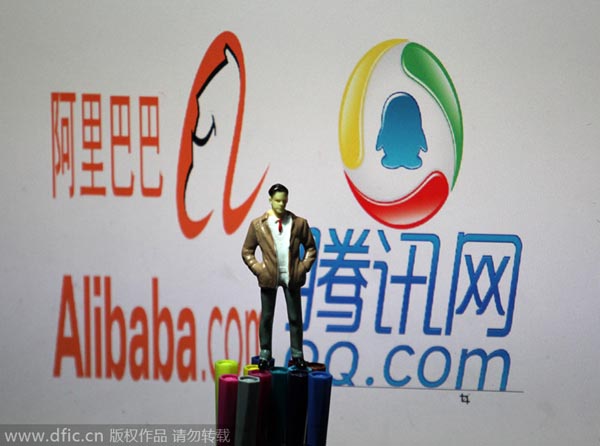 |
|
Photo taken on Jan 9, 2014, shows the logo of Alibaba, and Tencent. [Photo/IC] |
While China's Internet and e-commerce industries continue to grow, the intense rivalry between domestic giants Alibaba Group Holding Ltd and Tencent Holdings Ltd is deepening.
Both continue to expand impressively, domestically and internationally. Both also continue to attract massive media attention.
For example, Tencent recently managed to surpass China Mobile Communications Corp as the most valuable Asian brand, according to Millward Brown's BrandZ survey.
And it was reported that Alibaba plans to commence a float roadshow in early September for its long-awaited initial public offering in the United States.
But despite this apparently fierce competitive battle, Tencent and Alibaba appear to be pursuing quite different corporate strategies. Nowhere is this difference more stark than their investment and diversification moves.
Alibaba, founded and led mostly by the Zhejiang-born Jack Ma, continues to stretch its corporate brand with investments far outside the e-commerce, Internet and high-technology sectors. The company's investment in finance, entertainment and healthcare this year alone has exceeded $6 billion with no clear, cogent strategy underpinning many of these moves.
A prime example of Alibaba's rather rash diversification occurred only a few months ago with the purchase of a 50 percent stake in China's most successful football club, Guangzhou Evergrande, for $192 million.
Tencent, in stark contrast, co-founded and led by Ma Huateng, has adopted what appears to be a very well-thought-out strategy of related diversification.
In particular, Tencent invests frequently in startups with obvious potential and does not stray far from its Internet roots. Recent examples of this far more considered expansion and diversification investment strategy include the 36.5 percent stake share in Sogu Inc's search engine business at a cost of $448 million in September 2013, followed by a 20 percent investment in restaurant-rating and group-buying website Dianping.com in February this year.
Most significant was an investment of $215 million for a 15 percent stake in e-commerce site JD.com Inc only a few months ago.
Why do these two e-commerce giants pursue such different investment and expansion paths? Perhaps the answer lies, at least partly, in the personalities and career backgrounds of their founders.
Alibaba's Jack Ma appears far more entrepreneurial with little or no real corporate career experience before launching the company in 1999. He also possesses no apparent tertiary education related to e-commerce, with only an undergraduate qualification in English from Hangzhou Normal University, having initially failed the entrance exam twice.
In contrast, Tencent's Ma Huateng has undergraduate and postgraduate qualifications in science and technology from the nationally ranked Shenzhen University. And before launching Tencent in 1998, Ma Huateng pursued a successful corporate career at China Motion Telecom Development Ltd, where he quickly rose to the senior position of director of research and development.
Ma Huateng also maintains a much lower public profile than Jack Ma, with Tencent's corporate strategy announcements presented far more as a company rather than a personal initiative.
Alibaba and Jack Ma have been applauded, and rightly so, for the emergence of a much-needed entrepreneurial influence across Chinese business. But while such a pure entrepreneurial approach works well with startups, economic history tells us that only a few startups go on to achieve lasting global status.
